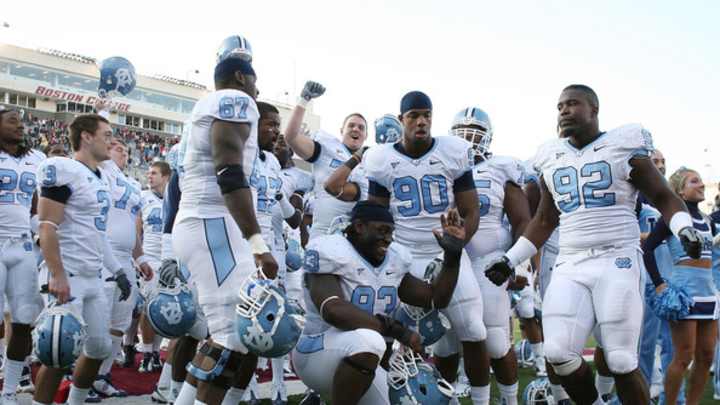EJ Wilson On Falling Back on His Degree After Short NFL Career

The average career in the National Football League lasts just 3.3 years. For E.J. Wilson, it was just two games.
The former University of North Carolina defensive end always knew his future would be in football, but what the now-32-year-old didn’t realize is that his contributions would be away from the field.
Born as the youngest of three in small-town Emporia, Va., Wilson wanted to go to Virginia Tech. Butch Davis changed his mind, enticing him to go to UNC where his education gained is what stands out.
“When I look back on my life, I think that was the most important decision I ever made simply because of some the relationships I’ve built,” Wilson said. “I feel better about it now than I did in school because I didn’t understand the magnitude of the decision I made.”
It took Wilson some time to adjust to Chapel Hill. Being from a predominately black community, Wilson said that college was the first time he saw different races inter-mingling. He wanted to move back to Virginia – until he stepped on the football field.
“Being a football player, that’s always what you wanted to do, be on stage,” Wilson said. “Coach Davis used to tell us the only time it matters is when that blimp is in the sky, that’s when you know you're playing a big time school.”
From 2006-09, Wilson started 37 games for the Tar Heels, recorded 150 tackles, 12 sacks and forced four fumbles. One of those sacks and forced fumbles came in 2009 against Boston College.
“It was an ACC game, road game and a game we were trying to win for that final push into a bowl game,” Wilson recalled. “Being a captain, and looking at my brothers, I was focused and looking to win. Our defense scored two touchdowns before our offense got onto the field. That game was special to me and one I will always look back on.”
It was in that 2009 season, that Wilson realized his career would extend beyond college, but he wasn’t okay with just going pro. He wanted to make sure he was prepared well after his 3.3 prescribed years.
“I was a different kind, I actually chose Carolina because it’s a good school,” Wilson said. “I knew that playing football would not last forever. I needed a degree that was going to speak for itself.”
Before becoming a fourth-round draft pick of the Seattle Seahawks, Wilson earned a degree in exercise and sports science.
On Nov. 7 2010, the Seahawks were playing the New York Giants. Already down 28-0 in the second quarter of an eventual 41-7 blowout, Wilson saw the field and got into the box score for the only time in his NFL career.
A first down pass from Eli Manning was completed over the middle to Steve Smith for eight yards. Wilson made his first and only professional tackle.
Sixteen days later he was cut.
Tampa Bay signed Wilson and brought him into camp in 2011, but in the second preseason game against New England, he ruptured his Achilles tendon. Wilson never played again.
“When the injury happened, it was really tough to deal with because that season I was going to split time with Gerald McCoy and we all know how great he is,” Wilson said. “At that moment, I felt like I was getting into the prime of my career and for it to be cut short, especially during a game I was playing so well, it was devastating.”
Wilson said he felt alienated after the injury. He was struggling emotionally with not being able to play the game he loved and he was struggling physically with an Achilles that wasn’t healing properly.
“My Achilles didn’t heal the way it was supposed to and it became worse,” Wilson said. “I could barely walk. That one injury steam-rolled into so many other things.”
Being forced out of the game early, Wilson had a degree to fall back on.
Wilson didn’t want to be a guy that bounced around from team to team struggling to hang on after an injury. Instead, he decided to help other athletes deal with their injuries.
Having studied exercise and sport science, Wilson has embarked on business development and is getting certified as a personal trainer. He hopes to become a strength coach and is starting a consulting firm that speaks with athletes about adjusting to life after their playing careers are done.
“To get something you never had, you have to do something you've never done,” Wilson said. “Coach Davis told us that. If you want something, you got to hustle and grind to go get it. Nothing changes if nothing changes.”
